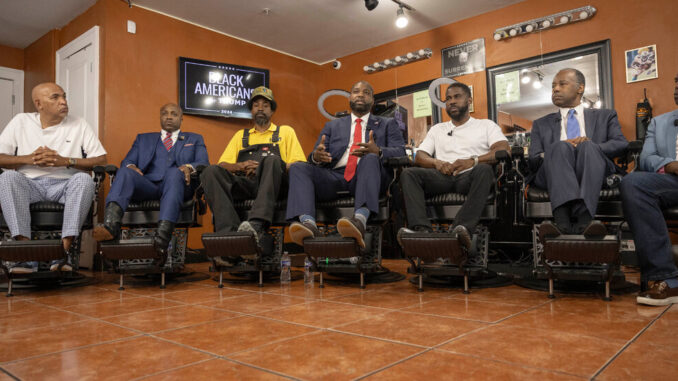
Before President Biden and former President Donald J. Trump take the stage in Atlanta on Thursday, their battle to engage Black voters has reached a fever pitch.
Surrogates, officials and organizers from both parties held a flurry of events in Atlanta barbershops, community centers and labor halls this week, using the backdrop of the early matchup between the two presidential candidates to encourage a crucial voting bloc in the heart of a key battleground state to turn back out in November.
Their efforts come as Black voters, long considered Democrats’ most loyal constituency, have voiced increasing frustrations with Mr. Biden and his party over the last several months. Some Black voters have suggested that they would support Mr. Trump in November or not vote at all.
But even as the Trump campaign aims to take advantage of the bloc’s softening support for Mr. Biden, it faces challenges in growing its grass-roots Black support and embracing policy positions that are popular with a broad enough swath of Black voters, particularly those who have supported Democrats in the past. Some of the challenges that the G.O.P. faces in fracturing Mr. Biden’s coalition were on display at these events.
A Republican-led discussion at a Black-owned barbershop on Wednesday in Atlanta quickly devolved as panelists vacillated among obscure policy suggestions, cultural grievances and at times ahistoric conjectures about Black Americans. One panelist referred to the trans-Atlantic slave trade as an “experience” and said that older generations of Black voters have generated “narratives that were divisive.”
Another, who said he was speaking on the panel in a nonpartisan capacity, suggested that Republicans might have a better chance of appealing to Black voters by “looking past Trump” to another candidate during the next presidential election. By the end of the 90-minute session, where reporters and Republican organizers far outnumbered potential voters, the owner of the barbershop, Rocky’s Barbershop, said he, himself, was not yet sure whom he would support for president this November.
“I’m just Black in America. I just want the right person to win,” said Rocky Jones, the owner. “I like the word ‘unity.’ I like to be diverse. I like who supports me. I support them. I like teamwork.”
Several prominent Black Trump campaign surrogates, including Representatives Byron Donalds of Florida and Wesley Hunt of Texas, as well as Ben Carson, the former secretary of the Department of Housing and Urban Development, attended the event. Mr. Trump also briefly called into the gathering, promoting his record on lowering Black unemployment and promising to lower gas prices if re-elected. He also repeated his claim that after his mug shot and, later, his felony conviction, his support from Black and Latino voters “skyrocketed” — a claim that Mr. Biden’s campaign immediately condemned as racist.
Representatives for Mr. Trump’s campaign did not immediately respond to requests for comment.
Democrats, for their part, sent dozens of Black surrogates to Atlanta to hold events around the city before the debate. Many of the Biden campaign’s policy-focused campaign events, while not explicitly geared toward Black voters, have been led by local Black officials flanked by Black community leaders.
Keisha Lance Bottoms, the former mayor of Atlanta who was named a senior adviser to Mr. Biden’s campaign, said during a Monday news conference that Mr. Biden had a “track record” of delivering for Black communities. Still, she and other Black supporters of the president face a much tougher battle in delivering that message to Black voters in battleground states like Georgia, where Mr. Biden won by fewer than 12,000 votes in 2020.
“The work has been done,” she said of the president’s policy record. “There’s always an opportunity to make sure we’re saying it more frequently and we’re saying it louder.”
The level of turnout among Black voters could decide the election, something to which Republicans are attuned. Those involved in organizing the events on behalf of the Trump campaign, including Mr. Hunt and Mr. Donalds, have said the primary aim is to grow support among a slice of that group, namely Black men, who in polls and focus groups have shown more openness to supporting conservatives.
“If there’s an indictment of how the party — the Republican Party — has run itself the last 60 years, it’s that it never took the time to go engage Black voters and say there is another way to listen to us,” Mr. Donalds said at a “Congress, Cigars and Cognac” event in an Atlanta suburb on Wednesday.


Be the first to comment